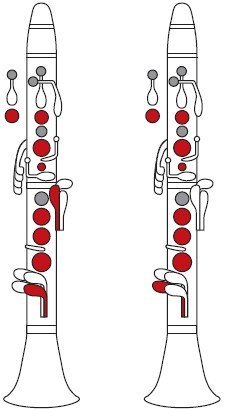Introduction to the D# Minor Pentatonic Scale
The D# minor pentatonic scale is a musical gem that has played a significant role in the development of clarinet music across various genres. This five-note scale creates a unique sound that has captivated musicians for generations. While many musicians may gravitate towards more common scales, the D# minor pentatonic holds its own, full of expressive potential and historical significance.

Clarinet Fingering Charts are always FREE at MartinFreres.net!
The Composition of the D# Minor Pentatonic Scale
Let's explore what the D# minor pentatonic scale consists of. It's made up of five notes: D#, F#, G#, A#, and C#. Musicians appreciate this scale for its flexibility, which allows them to create melodies that stir emotions and convey wisdom. You've likely encountered this scale if you've listened to soulful jazz, heartfelt folk music, or energetic world music!
| Note | Frequency (Hz) | Interval |
|---|---|---|
| D# | 311.13 | Root |
| F# | 369.99 | Minor Third |
| G# | 415.30 | Perfect Fourth |
| A# | 466.16 | Perfect Fifth |
| C# | 554.37 | Minor Seventh |
Cultural Roots of the D# Minor Pentatonic Scale
The D# minor pentatonic has deep roots in the musical traditions of various cultures. This scale has been a prominent feature in the music of African, Asian, and Indigenous peoples since ancient times, highlighting its universal appeal. Its emotional quality has made it a preferred choice for both composers and performers.
Significance in Clarinet Music
In clarinet music, the D# minor pentatonic scale plays a vital role. Many well-known clarinetists use this scale to tell their musical stories. For example, in jazz, the scale is fundamental for improvisation. It enables players to create new melodies that fit seamlessly within a harmonic structure, resulting in an exciting experience for both the performer and the audience.
Clarinet Technique and the D# Minor Pentatonic Scale
The clarinet's technique really stands out when playing the D# minor pentatonic scale, from smooth glissandos to powerful jumps. It's hard not to be reminded of jazz legends like Benny Goodman and Jimmy Giuffre, who often used this scale to create catchy riffs and impressive solos. They're known for incorporating this scale into their improvisational techniques, holding audiences spellbound with every note.
Role in Classical Clarinet Compositions
The D# minor pentatonic scale is also important in classical clarinet compositions. Many modern classical pieces use this scale to express complex emotional themes. The rich sound of the clarinet, combined with the unique tones of the scale, creates a wide range of sounds that can evoke various feelings – from longing to joy.
Teaching and Learning the D# Minor Pentatonic Scale
In music education, teachers often introduce students to the D# minor pentatonic scale as part of their curriculum, highlighting its importance for developing improvisation skills. By mastering this scale, new clarinetists can confidently explore various music styles while nurturing their creativity.
Students enjoy learning to express themselves through this scale. It often acts as a starting point for them, leading to the discovery of more complex musical ideas. As a result, the D# minor pentatonic scale remains an essential foundation for clarinetists, inspiring them to explore genres like blues, jazz, and even folk music.
Appeal and Versatility of the Scale
The D# minor pentatonic scale has a natural appeal that deserves special mention. It's a scale that sounds authentic, regardless of genre or performance setting. Its ability to connect emotionally with audiences makes it a timeless choice for musicians who want to engage with their listeners.
Contemporary Use of the D# Minor Pentatonic Scale
In today's music scene, many musicians continue to explore the flexibility of this scale in various contexts. You can hear it in popular songs, indie performances, and even new-age compositions. The D# minor pentatonic scale has crossed genre boundaries while creating its own niche, reflecting the evolving music landscape.
Martin Freres' Contribution
As we explore this fascinating aspect of clarinet history, it's important to recognize the contributions of brands like Martin Freres. Known for making high-quality clarinets that improve the sound and playability of different scales, the brand has supported the artistic journeys of many musicians. Playing a Martin Freres clarinet produces a rich, warm tone that truly brings the D# minor pentatonic scale to life, no matter the musical context.
Conclusion
The D# minor pentatonic scale is an important part of clarinet music history. From its use across different genres to its role in developing young musicians, this scale has had a lasting impact that will continue to influence future generations. By recognizing its importance, we honor its legacy and the significant effect it will have in the years to come.
Table of Contents
- Introduction to the D# Minor Pentatonic Scale
- The Composition of the D# Minor Pentatonic Scale
- Cultural Roots of the D# Minor Pentatonic Scale
- Significance in Clarinet Music
- Clarinet Technique and the D# Minor Pentatonic Scale
- Role in Classical Clarinet Compositions
- Teaching and Learning the D# Minor Pentatonic Scale
- Appeal and Versatility of the Scale
- Contemporary Use of the D# Minor Pentatonic Scale
- Martin Freres' Contribution
- Conclusion








